University practices help expand spirituality lens
I have never been able to understand why or how I chose to study at SPU.
Yet somehow, I felt strongly that it was where I was meant to be, and when I did not immediately get admitted in the spring of 2014, I was devastated.
In my mind, college was simply what you were supposed to do after high school.
Maybe it was really just because of all the importance teachers placed on it in high school.
When I didn’t get in on the first go (probably because I underachieved and put little dedication into high school), I wrote an appeal letter with the hope that I would be one of the few to be reconsidered, and I was.
By writing an appeal which explained to admissions why I was good enough to attend SPU, they decided to give me a chance, and I have been here ever since.
Though, getting back to my confusion of how I even chose SPU, I was not aware of how religious the university was and on the first day of my USEM course, “Other People, Other Faiths,” I was awakened to a whole new area of thought in the world.
I had known of the basics to Christianity and had been fully aware that my parents grew up in strongly different denominations of Mormonism and Southern Baptist (which have been great joke starters at any SPU gathering or party), but no other discussions were made about what other beliefs were held not only around the world, but even in my small bubble of Washington.
My parents never pressured or forcefully fed me ideas or beliefs they felt I was obligated to follow; I was given the freedom to choose what to believe in, but I had to believe in something.
After arriving at SPU and having to take the series of USEM, UFDN and UCOR courses, I was flabbergasted, yet also in a complete trance of amazement at being introduced to new ideas of faith, religions and traditions.
So much so that I didn’t know where to put it all, what to believe in or how to be a person of faith myself.
I came to the realization that I really couldn’t commit to one line of faith or the other.
Maybe part of it comes from my indecisiveness, or maybe it was from all the new information that was dumped on me after so many years of going uneducated that I just couldn’t find the time to make sense of it all.
As the end of my college career comes to a fast and exhausting end, my views of faith and religion have definitely filled out to more concrete ideas and answers I had previously felt so unsure about, but I still find myself questioning exactly what it looks like to be a Christian.
I often find myself coming back to the fuzzy question of, if I am to be a person committed to a certain faith, how do I then truly live out a life to the complete fullness under the said ideologies and obligations?
After the courses of UFDN 2000, where I finally read the entirety of The Bible, and UCOR 3000 where I finally came to the conclusion that maybe all religion is based on philosophical ideas that allow us to cope in life without feeling alone, I still find myself struggling why it even matters to conform to one set religion.
Looking at Judaism, Christianity, Catholicism, Hinduism; yes, they differ greatly from one another in practices, beliefs and traditions, but they also align in the end of believing there is something more powerful out there that created us and will give birth to a life afterwards.

Yet, each continues to choose to reflect on their obligated duties by crashing into one another with their differences, rather than joining in their similarities.
I am often reminded that I’m not alone in my struggles when trying to grasp the true essence of religion and what it means to be someone of faith, and many times, I’m left feeling validated in feeling confused when finding my conflicted questions can surface through others thoughts all too similar, such as in David Foster Wallace’s book of essays, “Consider the Lobster.”
“What exactly does ‘faith’ mean? As in, ‘religious faith,’ ‘faith in God,’ etc.”
Isn’t it basically crazy to believe in something that there’s no proof of? How can somebody have faith before being presented with sufficient reason to have faith?
Or is somehow needing to have faith a sufficient reason for having faith?” Faith, to me, can be such a wholesome and beautiful choice that allows people to feel certain and safe in their beliefs, and I feel certain that there could be a time that I finally find something I can join.
It’s when this individualistic choice, this self-belief turns into something as though it is a hierarchy of living and/or status, that I continue to fall back into the loop of questioning anyone’s real integrity.
The power of belief is only relatively new to me, so my observations and new conclusions can, one day, suffice to a better understanding.
For now I walk away from SPU with the opportunity to now hold conversations on religion I would of otherwise gone, maybe forever unable to.
But it has also given me the opportunity to have those conversations to feel comfortable with saying that I’m not a Christian and maybe never will conform to one set doctrine, but I do not look down in a judgement to those who do and/or do not seem to be the poster child of said faith.As long as you do not judge me, I will not judge you.
Katie is a senior studying communications.














































































